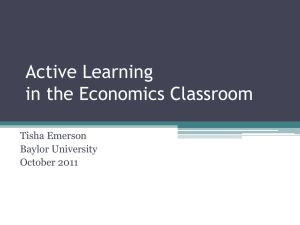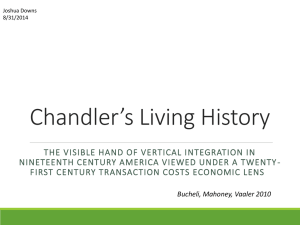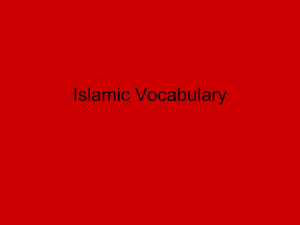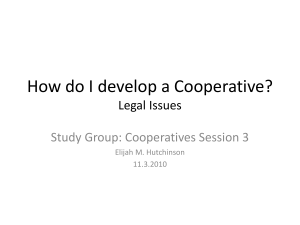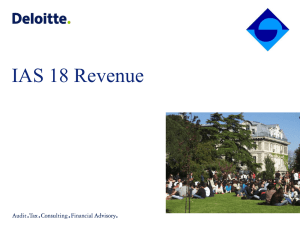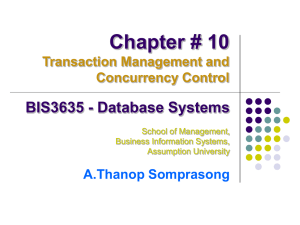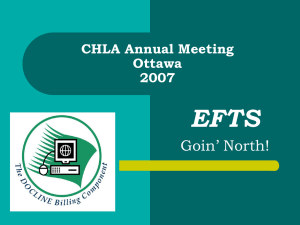Islamic Bookkeeping & Accounting Systems Presentation
advertisement
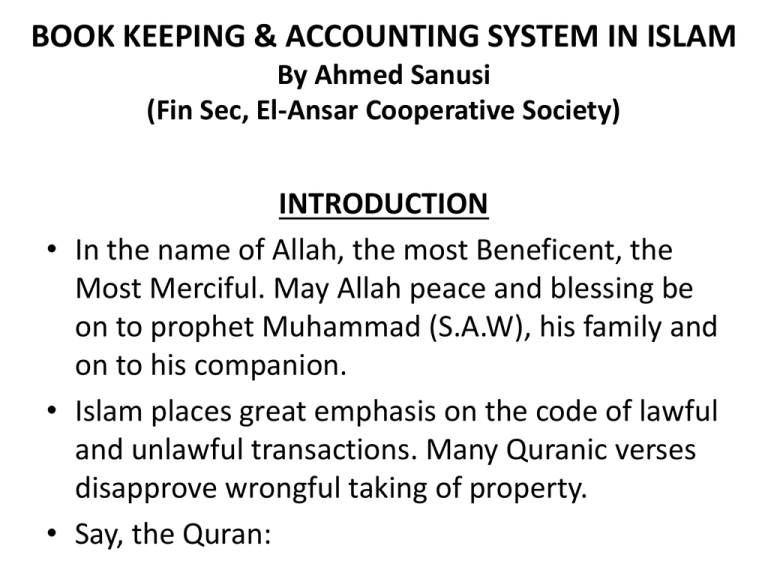
BOOK KEEPING & ACCOUNTING SYSTEM IN ISLAM By Ahmed Sanusi (Fin Sec, El-Ansar Cooperative Society) INTRODUCTION • In the name of Allah, the most Beneficent, the Most Merciful. May Allah peace and blessing be on to prophet Muhammad (S.A.W), his family and on to his companion. • Islam places great emphasis on the code of lawful and unlawful transactions. Many Quranic verses disapprove wrongful taking of property. • Say, the Quran: CONT’D • Do not devour one another property wrongfully, nor throw it before judges in order to devour a portion of other’s property sinfully and knowingly. (2:188) • Do not devour one another property wrongfully, unless it is by trade based on mutual consent.(4:29) • Prophet (SWS) was asked. What form of gain is the best? He said a man’s work with his hands, and every legitimate sale.(Ahmad, No. 1576). CONT’D • From above its clear that we should avoid illegitimate means of earning provisions and livelihood and matters that are dubious and doubtful. Therefore, Allah has permitted trading (business) and forbidden usury (interest). • The emergence of Islamic banks and other financial institutions in 1970s have stimulated modern literatures that have identified ways of addressing Islamic accounting. The increase in financial crime, misappropriation of fund and several corporate scandals and failure in recent past has put more pressure to professional accounting bodies in to new perception that goes beyond their stand, even though, the idea of attaching religious adjective to accounting may seen to be embarrassing , unprofessional and even dangerous. This is true when they feel that adjective’s Islam (other religion e.g Christian or Buddhist may at least sound peaceful to them) is against standard but Islam demands sincerity in work and purity of intention in business and other transaction. • There are accounting books and records that corporate organization should always maintain for preparation of financial information (statements) and reports to their various users. • • BOOK KEEPING: • Book keeping is an integral part of accounting; it is a way of recording financial transactions. It involves recording money received, amount paid, amount own other (otherwise known as creditors and debtors). It is the means of recording financial information in a financial accounting system. • It also involves recording the details of all the source documents in to journals (also known as book of first entry or day books). The book keeper is responsible for ensuring all transaction is recorded in a correct day book- supplier ledger, customer ledger and general ledger. • The primary books of account includes Cash Book, Bank Book, Purchase Book and Sale Book, they are all for recording immediate effect of the financial transaction. • Day Book- this is record of the day-to-day financial transaction. The day book details are enter formally in to journal and posted to ledgers: • -Sales day book, Sales credit day book, purchases day book, cash day book. • A petty Cash Book- this record of small value purchases before they are later transferred to the ledger and final account. CONT’D • Journal- is a formal way of recording financial transaction before their values are accounted for in the general ledger as credits and debits. • Ledger- this is also record of account, it takes each financial transactions from the journal and records them into corresponding account for every transaction. • -Sales Ledger- it deals mostly with account receivables accounts • - Purchase Ledger –it deals with purchasing transaction of an organization. • - General Ledger- it represent five main account Assets, Liabilities, EQUITY, Income and expenses. • The data collected from journal and general ledgers are the one used to prepare final account that is financial statement and report. Accuracy of these books have to be well checked to make sure it comply with sharia, since the report is made on the basis of those data collected from the books for use. • CONT’D Accurate book keeping is necessary for business to be successful, because it help to keep track of cash flow, monitoring and controlling expenses, tax and for evaluating profitability and growth of the business. ISLAMIC ACCOUNTING SYSTEM • Islamic Accounting can be defined as the accounting process which provides appropriate information (not necessary limited to financial data) to stakeholders of an entity which will enable them to ensure that entity is continuously operating within the bounds of the Islamic sharia and delivering on its socioeconomic objective. • In another word it is a tool which enables Muslim to evaluate their own accountabilities to God (in respect to inter human/environmental transaction). • Conventional Accounting is defined as to be identification, recording, classification and communicating economic events to permit to make an informed decision (AAA, 1996). • Both Islamic and conventional accounting is for business to provide financial information. DIFFERENT BETWEEN ISLAMIC ACCOUNTING AND CONVENTIONAL ACCOUNTING. 1 2 3 4 5. Islamic Accounting Conventional Accounting Islamic Accounting is always sharia compliance. It adheres to principle and rules of sharia to achieve certain socio-economic objectives. It must always identify socioeconomic and religious events and transactions. It complies to set standard by the national and international accounting boards. It must be holistic in its reporting; both financial and non financial measures regarding the economic, social, environmental, religious events and transaction are reported. Income recognition, islam has prohibited interest and other unlawful transaction. Application of zakat on accumulated wealth or net stock of assets. It concentrates on identifying economic events and transaction. The accountings report is prepared under the historical cost concept to measure and values assets and liabilities. Recognised all form of income that are not against western law. Application of zakat not applicable in conventional accounting CONT’D Islam accounting should function not only as service activity, providing financial information to users and to public at large but more importantly, accountants should discharge their accountability by providing information to enable society to follow God’s commandments. In term of responsibility, the accountant in islam is not only mere responsible to human superior, the management/client or shareholders but he/she is a servant and trustee to God in all situation. QUALITIES OF ISLAMIC ACCOUNTING INFORMATION 1. Understandability-accounting information should always be readily understandable by users. 2. Relevance-Financial information must be relevant to the decision need. 3. Reliability- information should always be free from material error and bias and can be depended open by users. 4. Faithful Representation-information should be faithful to present the economic reality of the transaction and events. CONT’D 5. Completeness- financial statement must complete within the bounds of material and cost. 6. Comparability- users of the information must able compare the financial statements of entity through time in order to identify trends in its financial position and performance. 7. True and Fair view-Financial statements should always show true and fair view of financial position, performance and changes in financial position. 8. Other include; Timeliness, Balance between Benefit and cost, Neutrality of information (free from bias). CONT’ 9. The posting of similar transaction should be perform by person independent from those who recorded the transaction in daily and other books. 10. Monthly or yearly report should be prepared and should be able provide sufficient information. 11.Annual report prepared should be audited by in depended body. SIMPLE ANLYSIS OF COOPERATIVE FINANCIAL STATEMENT Cooperative society plays a vital role in providing goods and services their members and also to the community. Cooperative annual report, generally contain the balance sheet and a income statement of operation. This simple analysis focuses on the balance sheet and income statement. 1. Balance Sheet. Cooperative society play a vital role in providing goods and services to their patrons and also to the community. Cooperative annual reports Balance sheet of a cooperative society states its financial position at the end of an operating period-a-12 month fiscal year. It includes: SIMPLE ANLYSIS OF COOPERATIVE FINANCIAL STATEMENT CONTD. Current Assets-these include property, plant, and equipment, investments and other assets. Current Liabilities- these also include short and long term debt, Member equities, and Accrued expenses. 2. Income Statement The income statement shows the results of operations for the past year and usually includes both current and prior year. It lists all sources of revenue and expenses. The statement measure the profitability of the cooperative for the given period of time. ANALYSIS CONT’D Income Statement include; Net sales, Cost of Goods sold, Gross Merging, Service and Other income, Operating Expenses, Employee Expenses, General Expenses, Depreciation, Bad debts, Bank charges and other related expenses. Net Income is the profit after all expenses have been deducted. • 3. Note of account. • These are series of notes or information that referred to in the main body of the financial statement. It gives further detail on the numbers in the account. The importance of these numbers should not be under estimated, the account are not complete without the notes. • The note helps to explain specific items as well as provide a more comprehensive assessment of financial condition of cooperative. ANALYSIS CONT’D • 4. Comparative Analyses Current with Previous period. • Comparative statements are financial statements that cover a different time frame, in a manner that makes comparing line items from one period to another for easy process and decision making. It help to determine the present stage of business whether the re growth in the organization or not, and also to determine the area of strength and weaknesses. Specimen of Balance Sheet Specimen of Income Statements APPROPRIATION OF NET SURPLUS =N= Net Surplus xxxx Reserve Fund xx% Education Levy xx% Dividend xx% Donation xx% Executive Council’s Honorarium xx% AGM Expenses xx% This appropriation depends on the byelaw provision of cooperative society. Xxxx Xxxx Xxxx Xxxx Xxxx ANALYSIS CONT’D • Good prepared financial report or statement make cooperative society to strengthen it economic position and that of its members. It also helps the cooperative to develop strategies to obtain goods and services to its members at lower cost. • Good financial report help cooperative improve services and operating efficiency; It create clear image of the organization. RECOMMENDATION • The following are some of recommendations that can help the cooperative society to develop its financial transaction: 1. Transaction should always be record immediately when they occur. 2. Transaction should be classified according to their nature. 3. Receipts are to be recorded with details. 4. Payment should be recorded with sufficient explained on ledger. 5. Recorded transaction should always be carefully explained. 6. Any correction to a recorded transaction by overwriting or deletion should always be proven that mistakes occur. 7. When account is closed, a specific sign should be place in the book to reflect closure of the account. 8. All similar transaction recorded in the primary book are to be posted to the specialized book to maintain for the type of transaction. CONCLUSION • Many Isalmic accounting system were developed and implemented in muslin society to suit the need of Islamic state with sharia compliance. Zakat and prohibitation of interest in business transaction are main factor contributed to the development of Islamic accounting, book recording procedure and financial reporting. These accounting systems necessitated the establishment and specification for recording business transaction and accounting procure. • Therefore, it is important for muslim accountants to adopt Islamic accounting procedure which are specially adopted to Islamic needs

